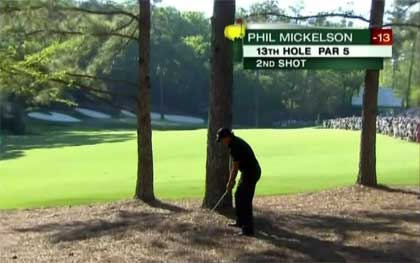
[Bianculli here: I'm thrilled to welcome another new contributing writer to TV WORTH WATCHING. He's Gerald B. Jordan, a former TV critic, current journalism professor, and fervent weekend golfer --all of which is why he is the perfect guy to write about the thrilling Masters tournament just broadcast by CBS...]
CBS Presents a Perfect Masters Tournament
By Gerald B. Jordan
The planets were aligned properly, the perfect cast was assembled, the weather was astonishingly beautiful and Augusta National, which yesterday could have been taped for a demonstration of high definition TV, was equal to the task.
Script writers could not have penned a more perfect Masters yesterday. The season's first men's major was so high on the drama meter that it was nearly cliche-proof.
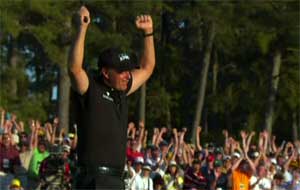
From the return of Tiger Woods to the rise of Phil Mickelson, the four days of Masters golf brought long-missing casual viewers back to their flat screens to watch a contrite Woods take a few strokes at immortality. Imagine the headlines if he had won this, his first tournament after a five-month self-imposed exile.
From the grim reality department comes this wisdom: When Woods joined the PGA tour, there were nine golfers who in a season were million-dollar winners. Now there are more than 90 and most of those viewers who peered into their television sets over the weekend wouldn't recognize 75 by name and 85 by face. Woods' impact on the tour is indisputable, even by those players who took a few shots at his domestic turmoil during his absence from the scene.
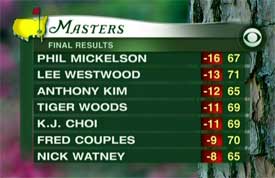
The finale yesterday needed no outside information for fans, whether casual or intensely serious. With Woods and K.J. Choi in the next to the last group and within shooting distance of the lead, CBS parlayed that potential into a compelling five hours. And CBS did so even as Woods and Choi faltered. As the final group took the tee and leader Lee Westwood had his troubles, the dullness of Phil Mickelson's string of pars erupted into a rally that unleashed roars across stately Augusta National.
Woods no doubt factored the freakish controls exhibited by Augusta National into his decision to return to the tour on this stage. The atmosphere there is so traditional that the course frequently is called a "cathedral of golf." The announcers speak in seemingly more hushed tones there than anywhere, including Royal St. Andrews, the home of golf.
The atmosphere was so controlled yesterday that even the commercials were low-key and high brow. There were no bawdy beer commercials with frat-house scenes played out. The ads were more of the institutional variety, something more suited to the Sunday morning news/talk programs.
So when the gallery roars erupted, CBS joined the control chorus by withholding, sometimes for more than a few moments, what set off the patrons. When the action was revealed, though, the living-room gallery had the best seats. Golfer and casual viewer alike could almost feel the unsteady pine straw, then marvel at how Mickelson launched a missile from a pine grove to within eagle-putt range on No. 13, but had to settle for a birdie (weekend hackers everywhere would donate body parts for that shot and result).
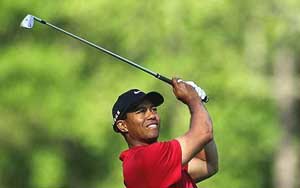
Woods hit a tree so hard that David Feherty likened it to a cricket shot. Then Woods recovered from that with a towering shot out of the trees to get within five feet of the pin on No. 11.
Choi was steady. Westwood was at times unsteady, but occasionally sensational. Anthony Kim, all youthful and vigorous, put on a Masters clinic away from the intense scrutiny of the final and next-to-final groups. His blazing putts pushed him to 12 under par and third place.
It was another occasion on which the PGA likely outpolled the NBA in Nielsen homes. How many can truly say they watched Portland at the Los Angeles Lakers, with so many eagles and birdies flying -- along with plenty of bogey interruptions -- on CBS?
In a week when Tiger Woods restated his intentions of avoiding excessive celebrations and profane outbursts, the Masters summoned the full range of emotions from golfing peaks and valleys. Woods kept his word, with a couple of exceptions. He even submitted to an interview after a round when his simple mistakes unraveled the good done by his eagle and birdies.
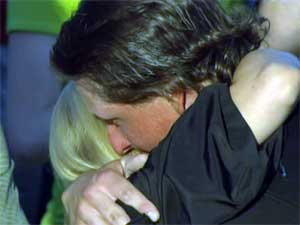
But it was Mickelson's emotional embrace, first of his caddy on the 18th green, then his wife Amy off the course. Amy Mickelson is undergoing treatment for breast cancer; so is Phil's mother. Amy Mickelson had rested in bed all week. Phil gave her quite a lift; the cameras were there to tell the story.
--
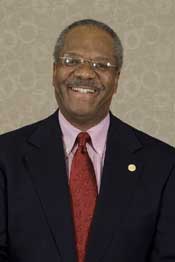
Gerald B. Jordan is an associate professor of journalism at the University of Arkansas. Earlier in his career, he was a respected, unusually well-dressed TV critic for the Kansas City Star.